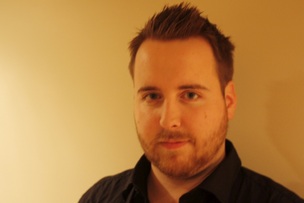 Andrew F. Sullivan Andrew F. Sullivan Andrew F. Sullivan is the author of All We Want is Everything (ARP Books, 2013). His short fiction has been published in places like Grain, EVENT, The New Quarterly and Joyland. Sullivan no longer works in a warehouse. Andrew Sullivan will be visiting Western University as part of the 2013-14 Creative Writers Series. Everyone is welcome to this free public reading in UC 224A on October 8th, 2013 at 2:30-4pm. Andrew's short story "Hatchetman" was published in Issue 2 of The Rusty Toque, and it appears in his new collection. RUSTY TALK WITH ANDREW F. SULLIVAN Alex Carey: What is your first memory of writing creatively? Andrew F. Sullivan: When I was nine or so, I started rewriting The Lost World starring my friends while I was supposed to be doing work at school. I would read it out loud at lunch or recess before we went to go and play soccer, or whatever. Usually, I would try to kill off one friend a day—by lion, spike pit, alien invaders or velociraptor. Maybe a grizzly bear. They seemed to get a kick out of it—who would I kill off next and how? Everyone’s time would come. It was like some volatile mixture of The Chronicles of Narnia, Indiana Jones, Jurassic Park, The Hardy Boys and The Neverending Story. Kill your darlings, or at least the people closest to you. AC: Why or how did you decide to become a writer? AS: I wanted to do something that made me feel good. I had a compulsion. A selfish compulsion to do what made me feel best. Even on the worst days, writing is what makes sense. I don’t need a studio or a massive budget or other people. I just need me. And that’s what can make it scary, too. You have no one else to blame. I decided to write because I had to write. Because if I didn’t, I’d end up doing something else selfish, with nothing to show for it but a long list of mistakes, debts and hospital visits. AC: Can you describe your writing process? AS: Find a library. Sit down with the laptop, headphones, and a bottle of water. Try to parse out the terrible things in my head, the lovely things we want to be true and the place where they meet in between. Take a number of breaks. Listen to the Russians yelling at each other in the newspaper section. Read about a toxic spill, a fallen idol, a country torn around the edges. Avoid getting run over by children. Clip and collage the pieces, the fragments that sound right. Force them into new shapes, uncomfortable shapes. Let it all sit for a couple weeks, let it simmer and grow old. Take a look at the mess a few weeks later and try to pick out the pieces that are still usable, that still make sense. This can take a while. For something like a novel, it’s pretty much the same deal, but I have to crank up production. AC: What is the best piece of writing advice you've been given that you use? AS: “Don’t talk about it, be about it.” – Usher, musical sensation. That is not a joke. I truly believe it. It’s very easy to talk about writing, to make lists and tips and line them up like they are tools and not suggestions. You need to actually write to write. That’s basically what it comes down to in the end. I can tell you to avoid using certain words, to establish conflict, to line edit every piece, to read aloud, to remove your adverbs, to roll the chicken knuckles, read the tea leaves, swallow the right pill or sacrifice your idols at the altar of taste, but it’s all equally ridiculous. Talking about it goes nowhere. Be about your work. Finish it. Believe in it. Send it out into the world. AC: You recently published a short story collection—twenty snapshots of decay, loss, violence and beauty—called All We Want is Everything. Your publisher, ARP Books, is based in Winnipeg and co-founded by songwriter John K Samson. How did you get involved with ARP and what was that experience like? AS: I got involved with ARP when I sent John K. my work just to see what he thought of it. I had a novel and a short story collection, and I wanted to get an outsider’s perspective on them. I knew ARP did not really publish a lot of fiction at the time, but they had in the past. I am grateful John found something in my work and decided to pick up the short story collection. Working with a small press is a really great experience in a lot of ways. I was involved in a lot of the decision-making and the process of taking my document and turning it into an actual book. The cover image I had since 2007 ended up working out. Overall, it was just an extremely collaborative and generous process. The fact that it exists at all is a positive for me. AC: You're also the fiction editor at The Puritan. What it is like be on the other side of the publishing process? As an editor, what do you look for in the work that you publish? AS: It’s extremely illuminating to work on the other side, to see how the sausage gets made. You learn just how many other people are out there, writing, struggling to get published, just asking for someone to read their work, to recognize their attempt to touch the world outside. You also see how so many people somehow fail to follow directions, to refuse to read the magazines they submit to or ask whether or not the story would suit the publication. You learn to take rejection with a bit more grace. You learn it is not always about you—sometimes there’s just too much good stuff out there. And sometimes there is a drought. I look for work that will grab me on the first page, work that will make me second guess my assumptions, make me uncomfortable with the world. Clear lines, well-oiled machines with well-drawn characters. I want to be led down a path I would not take on my own. What I don’t need are more narratives that start in bars, that chronicle addiction, that remind us cancer is bad, child abuse is bad, divorce is bad. Stories about discovering oneself, about degrading women, about the one time you went to Europe or Africa and realized you had privilege, stories about manic pixie dream girls, about the one night we all got wasted and one of our friends made a terrible decision, about grad school or the glory of being an atheist—I don’t really have much patience for that anymore. None of this is a decree though—there is always an exception. Every rule needs someone to break it, to expose the maker as a fraud. AC: Traditionally, short story protagonists experience an epiphany, a sudden realization of their circumstance. You’ve said in other interviews that you prefer ‘reckonings’—an evaluation or judgment of self and place. In “Crows Eat Well” the narrator says, “there is something to salvage. Even now, the crows eat well” (23). Is that a reckoning rather than an epiphany? AS: What follows in the story is pretty much the definition of a reckoning, but the moment you cite is much more reflective and contemplative, I suppose. If I have to name that moment in one way or another, I guess it still falls under the guise of a reckoning, a return to spoiled land, acknowledging what is left and what can be used. I’m definitely not against epiphanies in all their wonderful shapes and forms, just wary of them. It’s very nice to pretend fiction teaches us something, to assume we have participated in some grand revelation. Usually though, our stories reinforce the values we already hold, the expectations we already have established in the dominant culture. Subverting those values isn’t much better—you still end up acknowledging their power in the process. My idea of reckoning I guess comes down to consequences—those still teach us something, but they are rarely entirely internal. Something has to happen. AC: Most of your stories are set in real—and pretty bleak—settings: factories, fast-food restaurants, motels, low-income housing. Other stories in your collection like “Towers” and “Cloud” involve menacing natural forces that seem more metaphoric. Was that an intentional deviation? Do you see your work heading in a more absurdist or supernatural direction? AS: Not so much intentional, more like happenstance. Even in these terrible, surreal environments, I still want my characters to respond and act like people. If the characters and the narrative are strong, the setting will be accepted. To me, there is no difference between a world plagued with sinkholes and our own world. A world where the sky is filled with birds shitting on everything is not too absurd to me; it’s just a deviation from the mean. I really don’t need any more stories about writing professors or failed relationships couched in current comforts. I can just read people bitching about that stuff online. I welcome realism colliding with something that might be read as surreal or absurd. Our whole existence and the protective nature of our current climate wants things to make sense, for there to be reasons, to fully elaborate on all the mysteries out there in the universe. But sometimes there is just a hole. Sometimes we don’t know. And that’s terrifying and awesome—awe filled with a sense of dread, of being overwhelmed by the world. We control so little. We want a fence to tell us which side is real, but we’re the ones who end up building it. And it isn’t sturdy. And it isn’t stable. And some people are stranded on the other side. AC: What is your funniest or favourite literary moment, if you have one? AS: Whenever somebody thinks it’s a good idea to write a book. And if we are talking in literature, it’s a bit from Harry Crews’ A Childhood: A Biography of a Place when he writes about the Sears/Roebuck catalogue and growing up as a sharecropper: “Nearly everybody I knew had something missing, a finger cut off, a toe split, an ear half-chewed away, an eye clouded with blindness from a glancing fence staple. And if they didn’t have something missing, they were carrying scars from barbed wire, or knives, or fishhooks. But the people in the catalogue had no such hurts. They were not only whole, had all their arms and legs and eyes on their unscarred bodies, but they were also beautiful.” 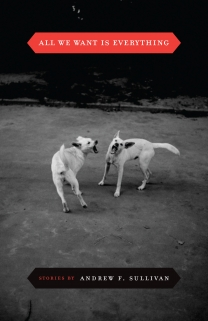 ANDREW F. SULLIVAN'S MOST RECENT BOOK All We Want is Everything, ARP Books, 2013 Description from publisher: All We Want is Everything, Andrew F. Sullivan’s exceptional debut collection of short stories, finds the misused and forgotten, the places in between, the borderlands on the edge of town where dead fields alternate with empty warehouses—places where men and women clutch tightly at whatever fragments remain. Motels are packed with human cargo, while parole is just another state of being. Christmas dinners become battlegrounds; truck cabs and bathroom stalls transform into warped confessionals; and stories are told and retold, held out by people stumbling towards one another in the dark. Frightening, hilarious, filled with raging impotence and moments of embattled grace, All We Want is Everything is the advent of a tremendous new literary voice. 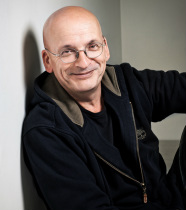 Roddy Doyle Photo by Mark Nixon Roddy Doyle was born in 1958. His work includes The Commitments, Paddy Clarke Ha Ha Ha (Booker Prize, 1993), The Woman Who Walked Into Doors, A Star Called Henry, and Bullfighting. His latest book is Two Pints (2012). A new novel, The Guts, will be published in August, in Ireland and the UK, and early 2014 in the USA. He divides his time between Dublin and confusion. RUSTY TALK WITH RODDY DOYLE Kathryn Mockler: What is your first memory of writing creatively? Roddy Doyle: I was about ten, I think, and my teacher, Mr. Kennedy, told the class to write something about a rainy day. This was Ireland, remember, so deep research wasn’t necessary. There were fifty-four boys in the class, and it was the first time we’d been told to write, or compose, anything—to make it up. I wrote about boredom. Mr. Kennedy looked over my shoulder, then read it to the class. KM: Why did you become a writer? RD: I loved reading. I loved football—soccer—but was a hopeless player. I loved music but hadn’t the patience or ability to learn an instrument. But I was literate, so writing seemed like an easy option. I forced myself into the habit, the routine. KM: What is the best writing advice that you’ve gotten that you actually use? RD: Treat it as a job; don’t expect magic. KM: How do you approach revision? RD: If by ‘revision’ you mean editing, I love it. So I approach it with a full heart and a red ballpoint. I tend to, deliberately, write too much. Editing is often a case of paring back. I’m fascinated, and sometimes worried, about how the deletion or addition of a word can alter meaning, tone, everything. When I’m editing, I put all other work aside and concentrate only on the pages I’m editing. I don’t play music, and I often lose track of time. KM: Your books often come out within a few years of each other. Do you work on multiple projects at the same time or stick to one project until it’s complete? Do you have difficultly switching from one genre to the next—particularly from adult fiction to children’s literature? RD: I work on different projects at the same time; I divide my working day, about 9am to 6pm, into chunks. As long as the projects are very different, they don’t tend to infect each other. I play a different type of music for each project. I could, I suppose, change shirts too, but that might be going too far. So, I can work for several hours on a novel, save it, hang out the washing, make a cup of coffee, change the Rolling Stones for Steve Reich, and get working on a treatment for a possible TV series or a book for children. KM: What writers were influential when you first started writing? Who are you reading now? RD: I think Flann O’Brien was important, particularly the Dublin dialogue in At Swim-Two-Birds. E.L. Doctorow’s Ragtime was important—the simplicity of the language. I’ve just finished George Saunders’ collection, Tenth of December; I think it’s magnificent. I’m reading a collection of J.G. Ballard interviews, called Extreme Metaphors. It’s great. KM: Given the amount of books that you’ve written, it seems impossible to imagine, but do you ever get writer’s block? And if you do, how do you overcome it? RD: No—never. KM: Do you ever abandon projects? If so, how do you know when it’s time to move on? RD: I’ve never abandoned, but I’ve parked projects for a while, stayed away from them until I was ready to look at them with that mixture of calm and excitement that I need if I’m going to work. Because I work on several things during the day, if one project isn’t going well, I can focus on another. KM: We often talk about the difficulty of rejection for writers but what about the problems that success can bring? After you won the Booker Prize in 1993 for Paddy Clarke Ha Ha Ha, for instance, what was it like sitting back down at the writing desk? RD: Success, however we measure it, is much nicer than rejection. But rejection can be like fuel to an almost empty engine. Rejection is a cousin of determination, and it’s part of the job. Success is too, if you’re lucky. The trick is, I think, to ignore it when you’re at your desk. I never let myself think that, just because I’ve won a prize, I’m not capable of writing shit. After winning the Booker, I couldn’t wait to get back to work. I love the work. KM: You posted your latest work Two Pints, which was just published in its entirety in November, as a serial on Facebook over the last year and half. Why did you decide to do this and what was the process like for you? Did the process have any affect on the end product? In other words, did the reader comments influence revisions? Would you do it again with another project? RD: I wrote the Two Pints pieces for fun. Someone suggested they’d make a good book, so—grand. It’s an accidental book, and still fun. I still write the Two Pints pieces, when the mood hits me and I have time. I often compose them as I’m walking, say, from the city centre, home. I type them up, make sure they’re less than 200 words, then post them on Facebook. I like the near-spontaneity of it—very different from how I normally work. It’s a little madness. I didn’t revise them, so reader comments, while nice, had no influence on them. I’d never be tempted to put work-in-progress up on Facebook. I don’t want to know what readers think until I know the work is finished. KM: What are you working on now? RD: I’ve just finished a novel, called The Guts. It’ll be out here and the UK in August, and the USA early in 2014. I’m writing a short story, about a man who’s injured when another man, in Lycra, cycles into him. I’m also working on a treatment for a possible TV series. ‘Possible’ is code for ‘It’ll never be made.’ I’m enjoying the job. Later this year, a musical based on my book, The Commitments, will go into rehearsal. I wrote the script, the ‘book’, so that will take up a lot of my time. I’m very excited about it. I’m tempted to say ‘I can’t wait’ but, actually, I can—just. 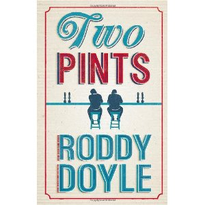 RODDY DOYLE'S LATEST BOOK Two Pints, published by Jonathan Cape, Vintage Publishing, 2012 Description from the publisher: Two men meet for a pint in a Dublin pub. They chew the fat, set the world to rights, take the piss… They talk about their wives, their kids, their kids’ pets, their football teams and--this being Ireland in 2011–12--about the euro, the crash, the presidential election, the Queen’s visit. But these men are not parochial or small-minded; one of them knows where to find the missing Colonel Gaddafi (he’s working as a cleaner at Dublin Airport); they worry about Greek debt, the IMF and the bondholders (whatever they might be); in their fashion, they mourn the deaths of Whitney Houston, Donna Summer, Davy Jones and Robin Gibb; and they ask each other the really important questions like ‘Would you ever let yourself be digitally enhanced?’ Inspired by a year’s worth of news, Two Pints distils the essence of Roddy Doyle’s comic genius. This book shares the concision of a collection of poems, and the timing of a virtuoso comedian.  Linda Svendsen Photo by Michael O'Shea Linda Svendsen's linked collection, Marine Life, was published in Canada, the United States and Germany and her work has appeared in the Atlantic, Saturday Night, O. Henry Prize Stories, Best Canadian Stories and The Norton Anthology of Short Fiction. Marine Life was nominated for the LA Times First Book Award and released as a feature film. Svendsen’s TV writing credits include adaptations of The Diviners, At the End of the Day: The Sue Rodriguez Story, and she co-produced and co-wrote the miniseries Human Cargo, which garnered seven Gemini Awards and a George Foster Peabody Award. She received the John Simon Guggenheim Fellowship in 2006. Svendsen is a professor in the Creative Writing Program at the University of British Columbia. RUSTY TALK WITH LINDA SVENDSEN Kathryn Mockler: What is your first memory of writing creatively? Linda Svendsen: In Grade 2, we were asked to write a rhyming poem and I had so much fun doing it that I went on for a dozen stanzas. Building on this major breakthrough, in Grade 3 I tried to write a sequel to Tom Sawyer in which Becky and Tom married (roughly 6 pages of careful heartfelt printing). KM: Why did you decide to become a writer? LS: I don't think I ever decided to become a writer; it's happened by default and I still wonder how it's all going to turn out. All I know is that I really enjoy writing fiction and for screen and that it allows me to pursue all the other activities I considered such as acting, directing, producing, social work, anthropology, history, etc. KM: What is the best piece of writing advice you’ve been given that you use? LS: Nancy Packer, fiction writer (and mother of New Yorker writer George Packer and novelist Ann Packer) told me to take my characters to the cliff. And push them over. KM: Your new novel, Sussex Drive, is a political satire offering readers a behind-the-scenes look at Canadian politics. Why did you decide to take on this subject matter? What do you hope readers take away from it? LS: Sussex Drive was inspired by Canada's federal prorogue-a-palooza in 2008 and 2009. It's about a Conservative Prime Minister's wife and a left-wing Governor General and what happens when they can no longer play "Follow the Leader." I was very intrigued by the Governor General's role and decision-making in December 2008—would she or wouldn't she allow the Harper government to fall and the coalition to take power? Also, as Canadians, we're immersed in the entertainment/propaganda of the U.S. and U.K. (and their political figures with The King's Speech, The Queen, Game Change) and our own turf seemed rich and virtually unexplored. And it's chick lit, too, for canuckleheads. KM: Sussex Drive reads like it’s written by a political insider. How did you approach the research for this project? Can you tell us about the process of writing this book? LS: Sussex started out as a short story after December 2008 and headed toward novella length. After the 2009 prorogation, it became a novel and I visited Ottawa—the Parliament Buildings, Rideau Hall, Gatineau Lake, Museum of Civilization, the War Museum, and Rockcliffe Park. I happened to be in London in April 2009 during the G-20 and found it fascinating that the Canadians seemed to be invisible to the British press. Random House Canada bought the novel in October 2011 when I had 140 pages written; I wrote from January to June 2012 (my editors were amazing!) and it was published last October. Tight deadline! KM: Many reviewers have commented on the sharp dialogue in Sussex Drive. In addition to writing fiction, you’re also an awarding-winning screenwriter. Do you plan on adapting Sussex Drive for film or television? If so, how do you plan on approaching the adaptation? LS: I'm trying to talk my husband into producing Sussex Drive, but he's busy with other projects right now. 6 x 1 hour or a TV movie...fingers crossed! KM: What are you working on now? LS: Right now I'm deciding what novel I'm writing next. Great space to be in. 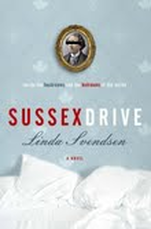 LINDA SVENDSEN'S MOST RECENT NOVEL Sussex Drive, Random House Canada, 2012 DESCRIPTION FROM THE PUBLISHER A startingly funny and deeply satisfying satirical novel that makes the Canadian political scene accessible from the female perspective, behind the scenes at the top of the hill. Torn from the headlines, Sussex Drive is a rollicking, cheeky, alternate history of big-ticket political items in Canada told from the perspectives of Becky Leggatt (the sublimely capable and manipulative wife of a hard-right Conservative prime minister) and just a wink away at Rideau Hall, Lise Lavoie (the wildly exotic and unlikely immigrant Governor General)—two wives and mothers living their private lives in public.Set in recent history, when the biggest House on their turf is shuttered not once, not twice, but three times, Becky and Lise engage in a fight to the death in a battle that involves Canada’s relationship to the United States, Afghanistan and Africa. The rest of the time, the women are driving their kids. From Linda Svendsen’s sharp and wicked imagination comes a distaff Ottawa like no other ever created by a Canadian writer, of women manoeuvring in a political world gone more than a little mad, hosting world leaders, dealing with the challenges of minority government, and worrying about teen pregnancies and their own marriages. As they juggle these competing interests, Becky and Lise are forced to question what they thought were their politics, and make difficult choices about their families and their futures—federal and otherwise. EXCERPT FROM SUSSEX DRIVE 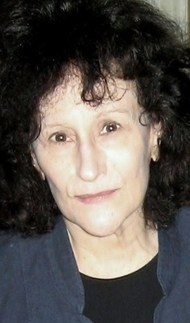 Lynne Tillman Lynne TillmanPhoto by Julia Jackson Lynne Tillman's latest book is Someday This Will Be Funny, a collection of short stories, published by Red Lemonade Press (2012). Her most recent novel is American Genius, A Comedy, published by Soft Skull. She is the fiction editor at Fence Magazine and Professor/Writer-in-Residence in the Department of English at the University at Albany. RUSTY TALK WITH LYNNE TILLMAN Kathryn Mockler: What is your first memory of writing creatively? Lynne Tillman: When I was eight, I wrote a composition about Charlemagne. My class was asked to write just one. But I got carried away, and wrote two. That thrill, rush, gave me a sense of power, freedom, pleasure—an eight year old's version. KM: Why did you become a writer? LT: I don't know why. I could give you reasons, but I really don't know other than to say that, when I was eight and wrote those little compositions, I loved it. I felt I was good at it, and decided right then to be a writer. KM: Could you describe your writing process? LT: I'm erratic. I don't have an everyday practice, except when I want to do it, want to write it, whatever it is. Then I become compulsive, and sit at my desk, at the computer, for hours without moving. Except for getting a cup of tea. But I can forget to eat, and begin to feel heady, dizzy. This is not great for the body, but I love that intensity, concentration, being inside what I'm writing. KM: Rejection or criticism can often stop new writers before they start. Do you have any advice on how to deal with rejection? LT: Rejection is different from criticism. Constructive criticism can help, but sometimes it's hard to handle, especially when you're just beginning to show your work. Rejection can be hell. Writers have to know that. But it's always miserable. I have no advice other than to say we all go through it, and if you can't get through it, you can't show your writing to others for publication. KM: What writers would you recommended to an aspiring writer? Or what writers were influential to you when you first started out? LT: Most important is how you read as a writer, not what you read. Reading crap is just boring. There are many good writers, fewer great ones; but if a writer reads critically, she can learn how it's done, and what she likes or doesn't and why. It aids in making choices if you know there are choices. KM: What is the best literary advice you've gotten that you actually use? LT: "Take your reader by the hand." My older sister told me that when I was 12. KM: Your favourite literary moment, if you have one. LT: Maybe my favourite moment was when the great writer Harry Mathews read aloud a piece I had written anonymously, because I was so insecure, to an audience at St. Mark's Poetry Project. I was astonished, surprised, happy, embarrassed; but it got some laughs, and gave me some courage. KM: What are you working on now? LT: A novel, my sixth, if I ever finish it. Right now I'm calling it Clouds and Apparitions, but Clouds may go. Not sure yet. LYNNE TILLMAN'S MOST RECENT BOOK Someday This Will Be Funny, Red Lemonade, 2011 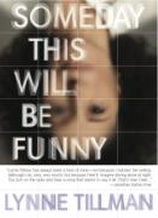 LYNNE TILLMAN AS AUTHOR PHOTO The black-and-white pencil drawing on the reverse of Someday This Will Be Funny shows a woman with a long, oval face, a thin nose, a strong chin, and a cloud of apparently blonde, curly hair. The black-and-white photograph on the flyleaf of the story collection Absence Makes the Heart shows the same woman, twenty-one years ago—the same thin lips, the same elegantly elongated nose. The woman looks like Glenn Close. She looks so much like Glenn Close, especially Fatal Attraction, Alex Forrest–era Glenn Close, that I spend at least fifteen minutes comparing results in Google image search. In color everything is clearer. The woman is Lynne Tillman. It’s funny that for a second I saw Alex Forrest—powerfully, primally, dangerously sexual, a female menace—one of those synaptic errors that later make a sort of sense, a tired brain conflating a time period, a radically direct portrayal of female sexuality, an aureole of hair. Or an error that later will simply be funny. Someday this will be funny. From The Literary Review, "Ruth Curry A Collection of Thoughts on Lynne Tillman, on the Occasion of the Publication of Her Twelfth Book, Someday This Will Be Funny" Lynne Tillman's characters inhabit language the way others live in rooms and cities. It's not that they are made only of words—all literary characters are—or that they don't have their own versions of material longings, needs, attachments, and obstructions. What's different is that they are attuned to language. They fraternize with words even when they are not talking. They treasure clichés and ready-made phrases as if they were messages or hints, turning them over to find their wisdom, or at least the joke wrapped inside them. In her collection This Is Not It (2002), when a woman makes a "last-minute decision," she very soon wonders what a "first-minute decision" would look like. There is an echo of this thought in Tillman's new story collection, Someday This Will Be Funny: "The decisive moment was an indecisive one for her." We instantly start adding up our own moments of that sort, finding far too many. From Bookforum, "Words to Live By: Comic stories interrogate reality, history, and language itself" by Michael Wood Despite the claim of the title, “Someday This Will Be Funny,” you wouldn’t want to reach for Lynne Tillman’s new book just for a good howl. In fact, that “someday” the title promises may never come. Tillman’s stories are too piercing, the obsessions of her characters too connected to their psychic wounds, for them to be considered exactly “funny.” In any case, it isn’t “someday” but rather “meantime” that counts for readers. And in the meantime, Tillman’s fictions tend to be (to steal a line from one of her stories) as “outrageously ineffable, obdurate and evasive” as the forms of desire they describe. Gorgeously at ease and technically virtuosic, the stories are ever on point — on point, that is, if the point of your reading has more to do with psychological nuance and bravura performances of language than with conventional story lines. From The New York Times Sunday Book Review, "Lynne Tillman’s Innovative Stories" by Forrest Gander 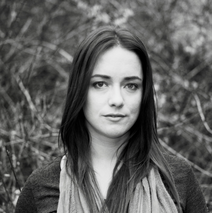 Ameila Gray Ameila GrayPhoto by Matt Chamberlain Amelia Gray is the author of AM/PM (Featherproof Books) and Museum of the Weird (FC2), for which she won the 2008 Ronald Sukenick Innovative Fiction Prize. Her first novel, THREATS, was published by Farrar, Straus and Giroux. Her writing has appeared in Tin House, American Short Fiction, McSweeney's, and DIAGRAM, among others. Find more at ameliagray.com or on Twitter @grayamelia. Kathryn Mockler: What is your first memory of writing creatively? Amelia Gray: My mom let me use her typewriter and I typed a story about Snoopy. I must have been 5 or 6. The story was heavily illustrated. I can't remember for sure, but I think some pretty bad shit happens to Snoopy. KM: Why did you become a writer? AG: It made me feel better when I was feeling low. KM: What influences your writing the most? AG: It's a toss-up between men, god and the internet. KM: Could you describe your writing process? (For example, do you write every day? When? Where? How do you approach revision, etc.) AG: I generally write in the morning, at my computer, in my little windowless office, in a WordPad file. I like to write every day, though sometimes when I don't have any projects going, I'll take some time off or stare at something in the morning or afternoon with the intention of revising it. KM: Rejection or criticism can often stop new writers before they start. Do you have any advice on how to deal with rejection? AG: Develop an ugly, unstoppable ego. KM: What writers would you recommended to an aspiring writer? Or what writers were influential to you when you first started out? AG: Barry Hannah, Flannery O'Connor, David Foster Wallace, James Joyce, Vanessa Place, Russell Edson, Sylvia Plath, James Tate, Raymond Carver, Richard Ford, Denis Johnson, Shirley Jackson. KM: What is the best literary advice you've gotten that you actually use? AG: Denis Johnson says you should write ten minutes a day. KM: What are you working on now? AG: Collecting short stories. Some other things. 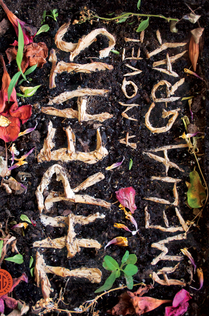 AMELIA GRAY'S MOST RECENT BOOK THREATS, Farrar, Straus and Giroux, 2012 Description from Farrar, Straus and Giroux David’s wife is dead. At least, he thinks she’s dead. But he can’t figure out what killed her or why she had to die, and his efforts to sort out what’s happened have been interrupted by his discovery of a series of elaborate and escalating threats hidden in strange places around his home—one buried in the sugar bag, another carved into the side of his television. These disturbing threats may be the best clues to his wife’s death: CURL UP ON MY LAP. LET ME BRUSH YOUR HAIR WITH MY FINGERS. I AM SINGING YOU A LULLABY. I AM TESTING FOR STRUCTURAL WEAKNESS IN YOUR SKULL. Detective Chico is also on the case, and is intent on asking David questions he doesn’t know the answers to and introducing him to people who don’t appear to have David’s or his wife’s best interests in mind. With no one to trust, David is forced to rely on his own memories and faculties—but they too are proving unreliable. In THREATS, Amelia Gray builds a world that is bizarre yet familiar, violent yet tender. It is an electrifying story of love and loss that grabs you on the first page and never loosens its grip. Read a new short story by Amelia Gray here and more short stories here. 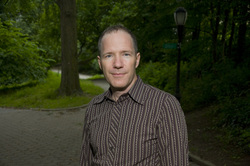 Rick Moody Photo by Thatcher Keats Rick Moody's acclaimed and prizewinning books include the novels Garden State, The Ice Storm, Purple America, The Diviners and The Four Fingers of Death. He has received the PEN/Martha Albrand Award, the Addison Metcalf Award from the American Academy of Arts and Letters, the Paris Review’s Aga Khan Prize, and a Guggenheim Fellowship. He lives in Brooklyn. RUSTY TALK WITH RICK MOODY Kathryn Mockler: What is your first memory of writing creatively? Rick Moody: As opposed to writing non-creatively? I remember attempting to start a novel in 6th grade. Didn't get very far. And there was a poem, in 7th grade, with the same syllabification and rhyme scheme as "Jabberwocky." (Lewis Carroll had just struck a chord with me.) I'm sure there were earlier examples of "creative writing," but I'm not always sure I know what that means. In some ways, all early writing is creative. It's precisely education that teaches us how NOT to write creatively. KM: Why did you become a writer? RM: I got fired from a lot of other jobs. KM: Could you describe your writing process? RM: How I have worked varies from project to project and from decade to decade. Right now, my process is: wait for the semester to end, then write like a maniac, as many hours of the day as are physically possible, bearing in mind the occasional social obligation or need to interact with my daughter. Otherwise: eat and sleep writing and writing-related projects. I don't do it in the same places all the time. I don't do it in the same way from day to day. So there is no science. Be alert to the possibility of language. Follow the language. And revise as much as you can until someone shouts at you that they need the assignment. KM: Rejection or criticism can often stop new writers before they start. Do you have any advice on how to deal with rejection? RM: Always be working on the next thing. KM: What writers would you recommended to an aspiring writer? Or what writers were influential to you when you first started out? RM: Melville Hawthorne Thoreau Joyce Beckett Wolff Faulkner Nabokov Paley Gaddis Barthelme KM: What is the best literary advice you've gotten that you actually use? RM: The only important part is the work. Pay no attention to any part but the work. If you can be content with that part of the job, you will never be disappointed. KM: What are you working on now? RM: A new novel, some stories, a few more essays on music, a poem, and so on. 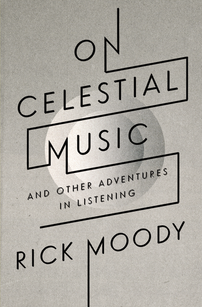 RICK MOODY'S MOST RECENT BOOK On Celestial Music and Other Adventures in Listening, Hachette Book Group, 2012 Description from Hachette Book Group Rick Moody has been writing about music as long as he has been writing, and this book provides an ample selection from that output. His anatomy of the word cool reminds us that, in the postwar 40s, it was infused with the feeling of jazz music but is now merely a synonym for neat. "On Celestial Music," which was included in Best American Essays, 2008, begins with a lament for the loss in recent music of the vulnerability expressed by Otis Redding's masterpiece, "Try a Little Tenderness;" moves on to Moody's infatuation with the ecstatic music of the Velvet Underground; and ends with an appreciation of Arvo Part and Purcell, close as they are to nature, "the music of the spheres." Contemporary groups covered include Magnetic Fields (their love songs), Wilco (the band's and Jeff Tweedy's evolution), Danielson Famile (an evangelical rock band), The Pogues (Shane McGowan's problems with addiction), The Lounge Lizards (John Lurie's brilliance), and Meredith Monk, who once recorded a song inspired by Rick Moody's story "Boys." Always both incisive and personable, these pieces inspire us to dive as deeply into the music that enhances our lives as Moody has done--and introduces us to wonderful sounds we may not know. Read an excerpt of On Celestial Music and Other Adventures in Listening. 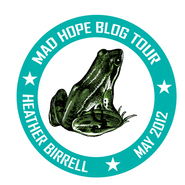 Heather Birrell is the author of the previous short story collection, I know you are but what am I? (Coach House, 2004). Her work has been honoured with the Journey Prize for short fiction and the Edna Staebler Award for creative non-fiction, and has been shortlisted for both National and Western Magazine Awards. Birrell's stories have appeared in many North American journals and antholoiges, including Prism International, The New Quarterly, Descant, Matrix and Toronto Noir. She lives in Toronto with her husband and two daughters where she also teaches high school English. 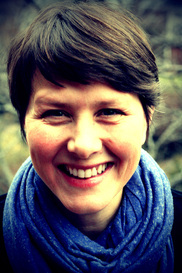 Heather Birrell Photo by Charles Checketts RUSTY TALK WITH HEATHER BIRRELL Kathryn Mockler: What is your first memory of writing creatively? Heather Birrell: I don’t know that I have a first memory of writing creatively although I certainly have some evidence of it. My grade one teacher put together a mimeographed anthology of stories based on Rudyard Kipling’s Just So stories—and I think mine was about why/how the camel got his hump. And I still have the book I was sent as a prize for being a runner-up in an OWL magazine story contest when I was ten. I do remember making up a lot of stories with my sister—I think an inordinate number of them were spin-offs from Annie, The Musical. We were obsessed with that movie and played the soundtrack incessantly. Then I also have diaries full of teen angsty poetry. It’s amazing how many times a person can use the word depressed in one sentence. KM: What keeps you going as a writer or why do you write? HB: I write because the world is a confusing, sad, beautiful place, and there are some amazing, complicated humans living in it. And I guess I feel some pressing need to communicate that to other people. It’s that drive to connect that really keeps me going—especially when my energy is low, or it seems like people don’t appreciate what I’m doing. And I also write because I’ve been doing it for a while now, and I’m getting better at it, but it never stops presenting me with new challenges. It feels like a passion without an expiry date. KM: Could you describe your writing process? HB: I have two small children (3 1/2 and 9 months) so it is pretty much impossible for me to write every day. I also have a full-time day job as a high school teacher (although I am on maternity leave right now), so my time really is at a premium. When I do get time I tend to be fairly focused, mostly because the time is so limited and circumscribed. I prefer to write in the morning—although I find coffee helps create morning-like conditions at other points in the day—and I can only create new work in a notebook, pen to paper. If I have a tricky scene to write, I often use timed writing to force me to confront the problem. I do most of my edits on the computer, then print out drafts and edit some more on the page. I have two pieces of conflicting advice for aspiring writers about the writing time/paying work conundrum: 1. Quit your day job. 2. Don’t quit your day job. I spent many years doing jobs here and there—temping, teaching ESL part-time, freelancing, housesitting—so that I would have time to write, so that I would have the freedom required to dream up stories. But then the stress of not having a steady pay cheque started to impede my creativity and eat up a lot of mental space. I needed a steady job so I could feel safe enough to create. Your life will change and your writing needs will change too—be fearless and be open, but make sure there are enough coins in the coffers to pay for a roof over your head and the occasional visit to the dentist. KM: Rejection or criticism can often stop writers before they start. Do you have any advice on how to deal with rejection? HB: Have people around you who understand that your writing is important to you and that rejection is hard—get them to give you hugs. The writer Judy Fong Bates once told me that a writer can’t afford to be thick-skinned—we have to be able to absorb experience to write about it—so I started trying to cultivate a rejection-resistant rather than a rejection-proof outer layer. If you are offered constructive criticism, take it as a compliment—an editor has taken time and effort because they see something worthwhile in your work. If your work is rejected outright do not see this as a sign to stop writing—see it as a sign to improve your work, to send it out again, to the same places and to different ones. Believe in your project to the point where you want badly to make it better, the best it can be. Celebrate your successes, however small. Take yourself seriously but not too. KM: What writers would you recommended to an aspiring writer? Or what writers were influential to you when you first started out? HB: When I first started writing stories I adored Lorrie Moore; she seemed different to me, less staid, than any other story writers I had ever read—and funny! I also couldn’t get enough of AL Kennedy—I so admired her bravery and sense of humour. It is really exciting to discover writers who challenge me and give permission to try new things or open up in different ways—this doesn’t change. No matter how accomplished, a writer always needs to feel uplifted, spurred on, astonished by fantastic writing! Recently, my inspirations have been Deborah Eisenberg, Amy Bloom, Mary Gaitskill. But I also get jazzed by great essays in periodicals or a wonderful film or song lyric. KM: Your funniest literary moment? HB: Hmm. I did a reading with Darren O’Donnell (playwright, novelist, provocateur, fellow Coach House writer) once. He was up right before me and stripped naked in the course of his reading. How to follow that? It was terrible. And funny, maybe. In retrospect. KM: Can you tell us about your new book Mad Hope? HB: Oh dear. This is my least favourite part of promoting a collection of stories—trying to answer the question What is your book about? It’s so hard for me to have any distance, and then when I do try to describe the stories, I always feel I’m missing something integral. It seems self-serving to tell people to just go read the book (but please do!), so I’ll cobble something here: Though the characters in Mad Hope—their settings and situations—are varied, the stories connect in that they concern people coming through loss with some notion that things will get better, that they will endure. This the 'Mad Hope' of the title. I'd say they're also about family, in their various forms—people struggling to build new families and often failing, people living in atypical families, people whose families are falling apart or are estranged. But again, there are moments of true connection between friends and family members, a measure of catharsis. And there are frogs on the cover! KM: What are you working on now? HB: I have some bits and pieces that might become stories. And a draft of a novel that I would like to make less draft-y. I’m also working on an essay for an upcoming anthology edited by the wonderful Kerry Clare of the excellent book blog Pickle Me This. And I’m working on some kind of workable balance between parenting and writing! 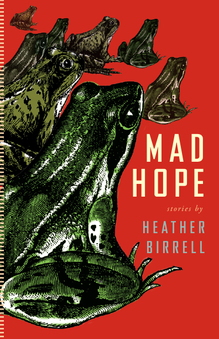 HEATHER BIRRELL'S MOST RECENT BOOK OF SHORT FICTION Mad Hope, Coach House Books, 2012 About Mad Hope In the stories of Mad Hope, Journey Prize winner Heather Birrell finds the heart of her characters and lets them lead us into worlds both recognizable and alarming. A science teacher and former doctor is forced to re-examine the role he played in Ceauşescu’s Romania after a student makes a shocking request; a tragic plane crash becomes the basis for a meditation on motherhood and its discontents; women in an online chat group share (and overshare) their anxieties and personal histories; and a chance encounter in a waiting room tests the ties that bind us. Using precise, inventive language, Birrell creates astute and empathetic portraits of people we thought we knew – and deftly captures the lovely, maddening mess of being human. 'This is a beautiful book: funny, whip-smart, compassionate, and gorgeously written. Heather Birrell belongs in the short story pantheon with Alice Munro, Lisa Moore, and Zsuzsi Gartner.' – Annabel Lyon
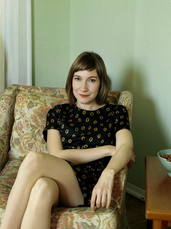 Sheila Heti Sheila Heti lives in Toronto. She works as Interviews Editor at The Believer and is the author of five books: the short story collection, The Middle Stories (McSweeney’s Books); the novel, Ticknor (Farrar, Straus and Giroux); How Should a Person Be? (Anansi) which is forthcoming in the U.S. from Henry Holt in the summer of 2012; an illustrated book for children, We Need a Horse (McSweeney's McMullins) featuring paintings by Clare Rojas; and a book of conversational philosophy with Misha Glouberman called The Chairs Are Where the People Go (Faber and Faber). Her work has been translated into German, French, Spanish, Dutch, Italian, Vietnamese and Serbian. Her writing has appeared in The New York Times, n+1, McSweeney’s, Brick, Geist, Maisonneuve, Bookforum, The Guardian, and other places. She studied playwriting at the National Theatre School in Montreal before attending the University of Toronto to study art history and philosophy. RUSTY TALK WITH SHEILA HETI Kathryn Mockler: What is your first memory of writing creatively? Sheila Heti: I don't have a first memory of writing. Or reading. Or speaking! Or hearing words. KM: What keeps your going as a writer or why do you write? SH: Because not much else makes time feel so bottomless. KM: How would you describe your writing process? How does revision figure into your process? SH: I write it first, then I revise it. Sometimes I revise it right then and there, and sometimes I wait a few weeks, months or years. It depends on the piece and how much in a hurry I am. Sometimes I don't know where I want to go with it. Then I leave it alone. There's always something to work on. I used to only work on one thing at a time, but I like having many things to work on, depending on where my mind wants to be. Now I can always be working. I don't have to be in the mood or any particular mood because if you have ten things on the go, at least one of them will be what you're in the mood for. KM: What influences your writing the most? SH: The time I'm at in my life. KM: What authors or books would you recommended to someone aspiring to be an writer? SH: I would mostly just recommend not reading a book to the end if you're not enjoying it. Forget about how it turns out and go find a book you actually like. I can't believe how people waste time this way, finishing books they're not enjoying. The book doesn't care. God doesn't care. Where does this imperative come from to finish a book one has started? Move on! KM: What is the best thing about being a writer and what is the worst thing? SH: The best thing is doing what you want to do with your life (if that is what you want to do--write) and there is no worst thing. Well, maybe the worst thing is that you don't get to mature in a steady way. It's really lumpy. It's sort of dependent on finishing books. Sometimes if a book takes a long time to finish, like you start it when you're 25 and finished when you're 35, then when you turn 35, you feel more like you're 26. It's hard to believe you're actually 35. 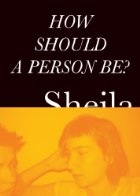 A RECENT BOOK BY SHEILA HETI How Should a Person Be?, House of Anansi Press, 2010 Description from House of Anansi From the internationally acclaimed author of The Middle Stories and Ticknor comes a bold interrogation into the possibility of a beautiful life. How Should a Person Be? is a novel of many identities: an autobiography of the mind, a postmodern self-help book, and a fictionalized portrait of the artist as a young woman -- of two such artists, in fact. For reasons multiple and mysterious, Sheila finds herself in a quandary of self-doubt, questioning how a person should be in the world. Inspired by her friend Margaux, a painter, and her seemingly untortured ability to live and create, Sheila casts Margaux as material, embarking on a series of recordings in which nothing is too personal, too ugly, or too banal to be turned into art. Along the way, Sheila confronts a cast of painters who are equally blocked in an age in which the blow job is the ultimate art form. She begins questioning her desire to be Important, her quest to be both a leader and a pupil, and her unwillingness to sacrifice herself. Searching, uncompromising and yet mordantly funny, How Should a Person Be? is a brilliant portrait of art-making and friendship from the psychic underground of Canada's most fiercely original writer. 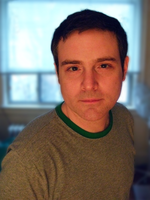 David Whitton Photo by Millie Whitton David Whitton grew up in London, Ontario and now lives in Toronto. His stories have appeared in the following journals and anthologies: The Dalhousie Review, The New Quarterly, Taddle Creek, The Fiddlehead, Best Canadian Stories, The Journey Prize Stories, and Darwin's Bastards. David Whitton is launching The Reverse Cowgirl in London, Ontario at the Forest City Gallery on December 2, 2011 at 8:00pm. See the Facebook event page for more details. RUSTY TALK WITH DAVID WHITTON Kathryn Mockler: What is your first memory of writing creatively? David Whitton: I wrote a Hardy Boys novel when I was eight or nine. Can't remember the title, but it was probably something along the lines of The Mystery of the Fuzzy Kitten Bellies. It was three, four, five pages long. I remember nothing about it, except that I desperately wanted to impress my oldest brother, Jim, who made an effort to fawn over it. His reaction to that novel kept me motivated for decades. KM: What keeps you going as a writer? DW: The three Ds. Delusion, denial, and desolation. Also the feeling, for just a few minutes every day, that all the moments in my life that I’d thought I'd pissed away actually have some sort of purpose. Because it all comes back to you, doesn't it? The girl you made out with in the park in grade ten. The surreal conversation you had with your uncle three months before he left the earth. It all comes back. These evanescent moments that you, privileged person that you are, now get to sink into amber. What a gift. KM: What is the revision process like for you? DW: It's like a women's prison movie. Except that I'm both the perverted, sadistic warden and the wrongfully convicted inmate. It's full of relentless self-abuse and almost existential self-questioning. But what can I do? It’s what I signed up for. KM: Rejection can stop new writers before they start. How did you deal with rejection when you first started out? DW: I rewatched Alexander Mackendrick’s great sleazeball drama, The Sweet Smell of Success. I reread Jesus' Son and A Good Man is Hard to Find and Will You Please Be Quiet, Please? I listened to Raw Power and The Velvet Underground and Nico and No Wow and confirmed to myself that my aesthetic was sound. It's important to remember that tons of people, even people in positions of power, don't know what they're talking about. Editors, publishers, and agents will often make decisions based on the most superficial of criteria. But if you’ve placed yourself in a continuum that includes Denis Johnson, Flannery O'Connor, and Raymond Carver, then no one can touch you. KM: What authors or books would you recommend to new writers? DW: I wouldn't. One thing I've learned, or am trying to learn, is that no one else's opinion counts for shit. Taste is identity. When you figure out what rocks you out, you figure out who you are and how you write. No one else matters. KM: Do you have a piece of literary advice for aspiring writers? DW: Avoid writers. Spend most of your time with electricians. Or bipolar No Frills cashiers. Or new-age construction workers. Or downward-spiralling Coffee Time franchise owners, or schizophrenic former bread-truck drivers, or women who used to be men. These are the people who will teach you how to live, and therefore how to write. And they'll give you your best material. KM: Your funniest literary moment, if you have one. DW: Most of my literary moments are unspeakably tragic. But I do cherish the memory of my wife Brenda coming into the kitchen and telling me that my book, The Reverse Cowgirl, had reached number 69 in the Amazon.ca short story charts. KM: What are you working on now? DW: My dream project. An epic southwestern Ontario white-trash crime novel. A while ago I met James Ellroy and got him to write "I'm yo daddy" in my copy of Blood's a Rover. I intend to prove him right. He's my literary daddy, at least for one book. 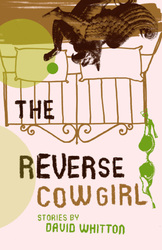 DAVID WHITTON'S MOST RECENT BOOK The Reverse Cowgirl, Freehand Books, 2011 Description from Freehand Books: Keen, intense, and darkly comic, the short stories of David Whitton are full of misfits, oddballs, dropouts, klutzes, and loners. You might dress em up, but it’s just a matter of moments till they unravel back into their fallen, and fascinating, selves. Their mistakes and misdeeds, temptations and transgressions thread their way through these stories, stirring up surprises on every corner. Whitton navigates current life and future worlds, dirty truths and murky fantasies, continually setting up, if only to send up, modern romantic scenarios. In the end, whether the lovers meet online or on acid, at a wedding or in battle, the object of ardour might be in for a rough ride. Maybe they’ll stay afloat—tremulous and tentative—or plunge to earth in delightful and refreshing ways. Praise for The Reverse Cowgirl “The Reverse Cowgirl is both hilarious and horrifying, as startling and poetic as a gargoyle dropped on one’s head, a corpse with a plastic flower instead of a face. Whitton writes the way a master painter paints—just a few well-placed strokes of his brush and he reveals worlds of vast and mesmerizing complexity. The characters in these stories are all at a loss in some way, and with his frightening talent Whitton makes readers care deeply for them, even while ashamedly laughing at them. He is marvelous in his ability to show the comic in the tragic, and he constantly forced me to question my own ethics, my own place in the world. A truly gifted writer and a truly kick-ass short story collection.” —Suzette Mayr 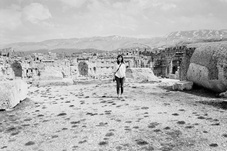 Madeleine Thien Madeleine ThienPhoto by Rawi Hage Madeleine Thien is the author of two previous books of fiction, Simple Recipes, a collection of stories, and Certainty, a novel. Her writing has appeared inThe Walrus, Five Dials, Brick, and the Asia Literary Review, and her work has been translated into more than sixteen languages. An excerpt from Dogs at the Perimeter appeared in Granta 114. Last year, she received the Ovid Festival Prize, awarded annually to an international writer of promise. She lives in Montreal. Blog: Dogs at the Perimeter. Madeleine Thien will be reading at the International Festival of Authors October 19-30, 2011. RUSTY TALK WITH MADELEINE THIEN How did you first come to writing? Through my sister, who taught me to read when I was about three years old. She made every story an adventure. What keeps you going as a writer? I want to write better books, I want to find the way of expressing a part of what we're living now, particularly the things that don't get talked about easily--certain histories, science, free will, and the individual. It feels like a lifetime's task. Or many lifetimes! What is the revision process like for you? This is where my writing happens, in revision and re-imagining, where I try to find out what I don't know. For me, it's the very centre of the process and it takes a long, long, long time and demands a complicated mix of confidence and humility. How did you deal with rejection when you first started out? I was young at the time and thought rejection was the natural order of things! It was the first acceptance that really surprised me. What authors or books would you recommend to new writers? Dostoevesky, Chekhov. But I think I would recommend the same to anyone, writers or not, at the beginning of their writing lives or not. Shirley Hazzard, James Baldwin, Cees Nooteboom, Kazuo Ishiguro, Eileen Chang, Colin Thubron, Roberto Bolano, Colette, Christopher Isherwood, Alice Munro, Bohumil Hrabal, Raymond Chandler, Ryszard Kapuscinski, and countless more... I would tell them to read widely, across disciplines and genres, and to read with generosity of spirit. The critical eye is important, too, but sometimes the critical eye blocks you from experiencing the book, or experiencing wonder. Is there an author that had a significant impact on your literary life? Many, but Cees Nooteboom and James Baldwin in particular. Their vision, and the risks they takes in their writing, as well as their lives of movement and travel, have always inspired me. A piece of literary advice for new writers. Be brave. Your funniest literary moment? I was in the hospital for a very minor surgery. Just as I was emerging from the anesthetic, I heard someone saying my name. I opened my eyes and saw one of the medical interns hovering above me, smiling, holding out a copy of my first book. He asked me to sign it for his wife. I could barely see! But I managed to sign it, and felt very proud and very pleased. 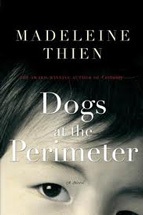 MADELEINE THIEN'S MOST RECENT BOOK Dogs at the Perimeter, 2011, McClelland & Stewart Description from McClelland & Stewart: Dogs at the Perimeter begins one winter, when Janie, a researcher in Montreal, suddenly leaves her husband and young son. She retreats to the home of her friend and mentor, the neurologist Hiroji Matsui, who has mysteriously disappeared. Their friendship, and the world Janie begins to reclaim in the wake of Hiroji's disappearance, are at the heart of Madeleine Thien’s eagerly anticipated second novel. Thirty years earlier, in 1975, Janie is a child in Cambodia. When the Khmer Rouge take control of the country, the fallen city of Phnom Penh is emptied. Together with her parents and her younger brother, Sopham, she is forced into the countryside. In the terror that follows, when to remember one’s own past becomes a crime against the revolution, her father, a translator, is taken away, and gradually her mother weakens. Survival depends on escape, and ultimately Janie and Sopham must undertake a treacherous journey through the flooded caves at the border, across the sea, and toward a new existence. Now, as she moves among Hiroji’s belongings, Janie salvages fragments of his past and, slowly, her own. Needing to find a truth she can be reconciled with, to make amends, she follows Hiroji’s story to Southeast Asia where she believes he has gone in search of his brother James, a Red Cross doctor who went missing in Cambodia many years earlier, and whose own story comes vividly, powerfully to life. |
Rusty Talk
Rusty Talk Editor: Archives
November 2017
Categories
All
|

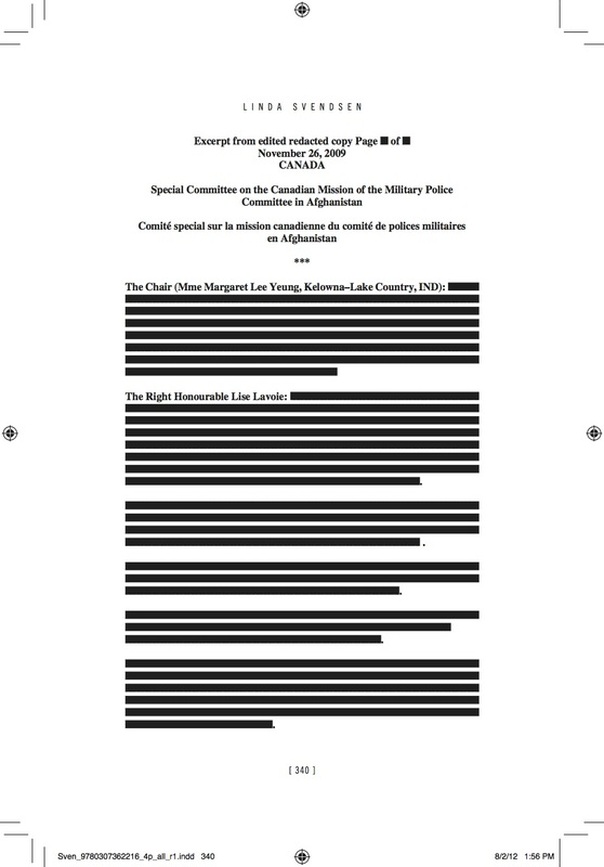
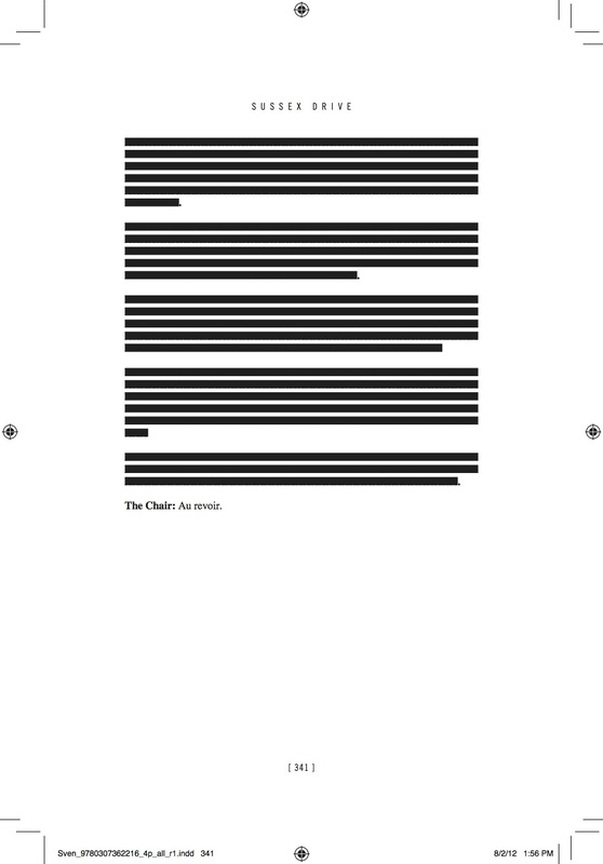
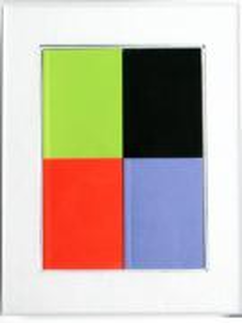
 RSS Feed
RSS Feed
